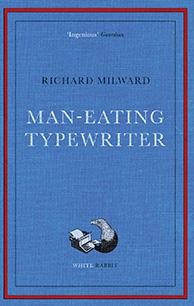Man-Eating Typewriter

‘We're all in the gutter but some of us are ogling the sparkles.’
Set at the fag-end of the 1960s and framed as a novel within a novel published by a seedy London purveyor of pulp fiction, Man-Eating Typewriter is a homage to the avant-garde counterculture of the 20th century.
Told in Polari, it is the story of an anarchist named Raymond Novak and his plan to commit a ‘fantabulosa crime’ in 276 days that will revolt the world. A surrealistic odyssey that stretches from occupied Paris to the cruise-liner SS Unmentionable to lawless Tangier before settling in Swinging London, the book casts Novak as an agitator and freedom fighter - but, as his memoirs become more and more threatening, his publishers find themselves far more involved in his violent personality cult than they ever intended.
Constructed like a hallucinogenic cocktail of A Clockwork Orange, Pale Fire and Jean Genet's jailbird fantasies, Man-Eating Typewriter is an act of seductive sedition by a writer with unfathomable literary talent and boldness. Wild, transgressive, erotic and resolutely uncompromising, this marks the return of a writer who is out there on an island of his own making; a book that will be talked about, celebrated and puzzled over for decades.
About the author
Richard Milward was born in Middlesbrough in 1984. His cult debut Apples was published in 2007 when Richard was twenty-two years old, followed by Ten Storey Love Song in 2009 and Kimberly's Capital Punishment in 2012.
Apples was shortlisted for The South Bank Show/Times Breakthrough Award 2008, Ten Storey Love Song was chosen as one of Waterstones New Voices 2009, and Kimberly's Capital Punishment was picked as Time Out Book of the Week in 2012.
Both Apples and Ten Storey Love Song were adapted for the stage, winning awards at the Edinburgh Fringe.
Judge Maddie Mortimer on Man-Eating Typewriter
"In this extraordinary technical feat, Richard Milward plunges us into the dizzying landscape of 1960s London with the story of Raymond Novak, an anarchist promising to commit the crime of the century, and the publishers hoping to capitalize on his violence.
"With remarkable command over the Polari slang that dances, spins, spits and slashes its way across the page, Milward has created a very rare beast of a book; one that is propulsive, relevant, outrageous, and often alarmingly beautiful. Here is a novel that lays bare the depravity of human impulse, whilst testing the limits of language and form with masterful ease and reckless glee.
"Man-Eating Typewriter emerges as a refreshing example of the most fun a person could have on a page and has all the transgressive energy of a cult classic in the making."